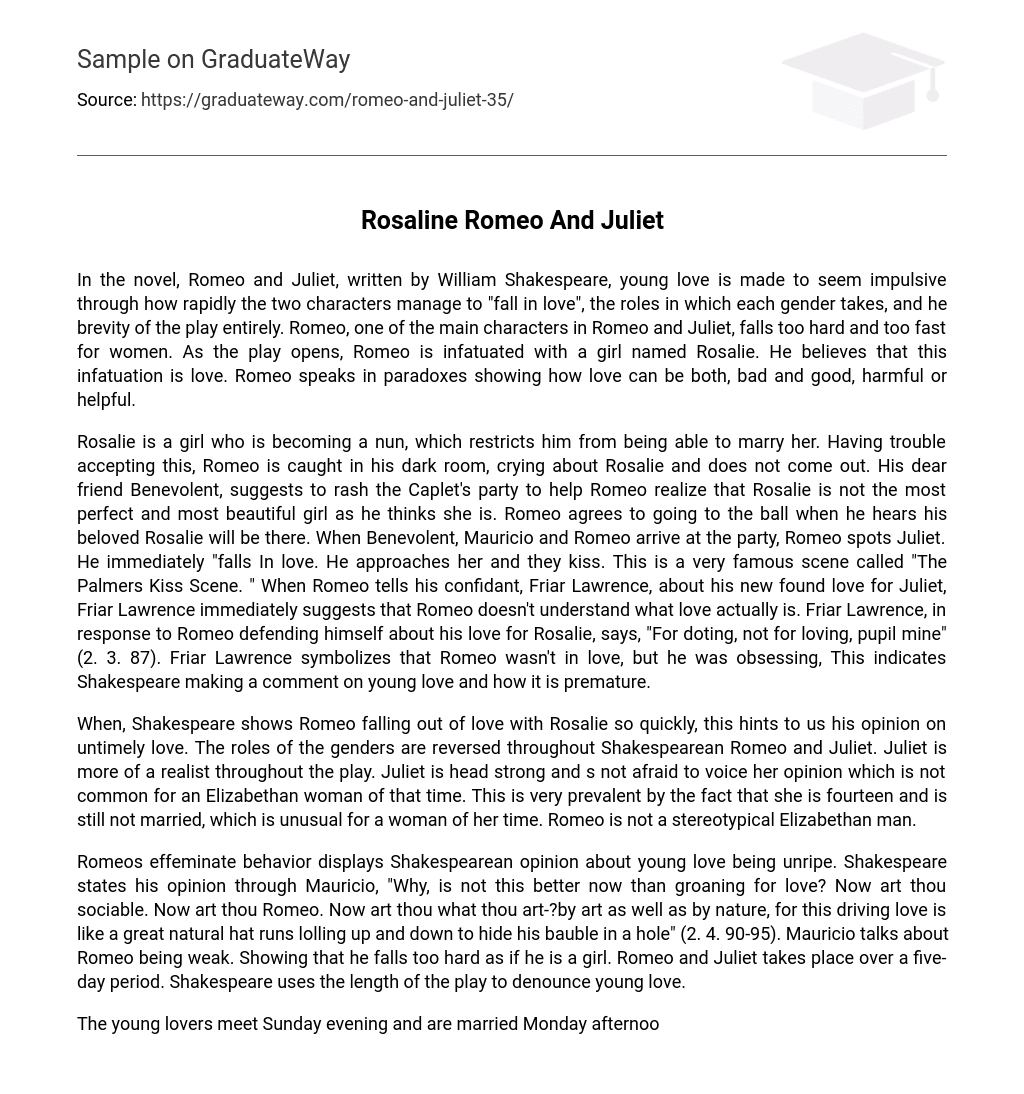In the novel Romeo and Juliet, written by William Shakespeare, the theme of impulsive young love is explored through the rapid development of feelings between the two main characters, the gender roles they assume, and the brevity of the play. Romeo, one of the protagonists, is depicted as falling deeply and quickly in love with women. At the beginning of the play, he is infatuated with a girl named Rosalie whom he mistakes for love. Romeo conveys his inner conflicts regarding love through his use of paradoxes, highlighting its dual nature as both detrimental and beneficial.
Romeo is in distress because Rosalie, whom he loves, is becoming a nun and cannot marry him. He retreats to his dark room and weeps for her, refusing to come out. His trusted friend, Benevolent, proposes crashing the Capulet’s party to show Romeo that Rosalie might not be as perfect and beautiful as he believes. Romeo agrees to attend the ball when he learns that Rosalie will be there. At the party, Romeo sees Juliet and immediately falls in love with her. They share a famous moment known as “The Palmers Kiss Scene” where they kiss. When Romeo confesses his love for Juliet to Friar Lawrence, the wise confidant questions whether Romeo truly understands what love is. Friar Lawrence dismisses Romeo’s defense of his love for Rosalie, suggesting that it is only infatuation rather than true love. This highlights Shakespeare’s commentary on young love and its tendency to be impulsive and premature.
Shakespeare implies his opinion on untimely love by depicting Romeo’s quick loss of affection for Rosalie. The gender roles are reversed in Romeo and Juliet, with Juliet being portrayed as a realistic and assertive character. This is particularly noteworthy considering the societal expectations for women during the Elizabethan era. Despite being only fourteen years old, Juliet remains unmarried, which was uncommon for women during that period. Romeo, on the other hand, deviates from the typical depiction of an Elizabethan man.
The effeminate behavior of Romeo in Shakespeare’s play showcases his belief that young love is immature. This perspective is conveyed through Mauricio, who asserts, “Why, isn’t this better than pining away for love? Now you are sociable. Now you are Romeo. Now you are truly yourself – both by nature and by acting, because this impulsive love is like a foolish little creature that scampers around to hide its trinket in a hole” (2. 4. 90-95). Mauricio comments on Romeo’s fragility, implying that he falls too deeply like a girl would. The events of Romeo and Juliet unfold within a span of five days, and Shakespeare employs this brief duration to criticize young love.
The young lovers meet on Sunday evening and are married on Monday afternoon. Shakespeare emphasizes that this young love is not genuine love, but rather a strong attraction. Despite the play’s brevity and seeming romanticism, Shakespeare effectively demonstrates how this youthful love will ultimately lead to tragedy. They were married for only three days before taking their own lives due to their intense feelings for each other. As Frissons argues in “Too soon marred”: Gullet’s Age as Symbol in Romeo and Juliet,” by meticulously calculating the number of letters, words, lines, stage entrances, and hours, Shakespeare transforms the character’s age into a powerful force that propels the play towards its catastrophic end.
The responsibility for the tragic events in Romeo and Juliet can be partially attributed to the Capsules, Paris, the Nurse, the Friar, and other adults who pressurize and manipulate Juliet into marriage at a young age. Shakespeare portrays Romeo as more of a romantic than Juliet, highlighting her immaturity and lack of readiness for marriage. This immaturity ultimately leads to the tragic outcomes in the play.
In a casket, Romeo discovers Juliet apparently lifeless, and he ends his own life by consuming poison, declaring, “Here’s to my love! (drinks the poison) O true apothecary’s drugs are quick. Thus with a kiss I die” (5. 3. 119-120). Shakespeare’s quote not only reflects on this unreciprocated love but also suggests that Romeo is more feminine compared to Juliet. While Romeo opts for poison to take his own life, Juliet, upon awakening to find Romeo dead, uses the sword from Romeo’s belt to kill herself. Young love remains inexpressive and harmful.
William Shakespeare uses his novel, Romeo and Juliet, to depict the insignificance and detrimental consequences of young love. This is evident through the swift changes in Romeo’s emotions, the portrayal of each character according to their gender stereotypes, and the rapid pace of the play. Romeo, being a romantic individual, struggles to differentiate between love and mere attraction. In contrast, Juliet defies the societal expectations of a typical woman during her time by voicing her opinions and exhibiting fearlessness. The length of the play magnifies the intensity of young love, pushing it to extremes. Despite certain positive aspects of young love, Shakespeare portrays it mainly as a mockery.





